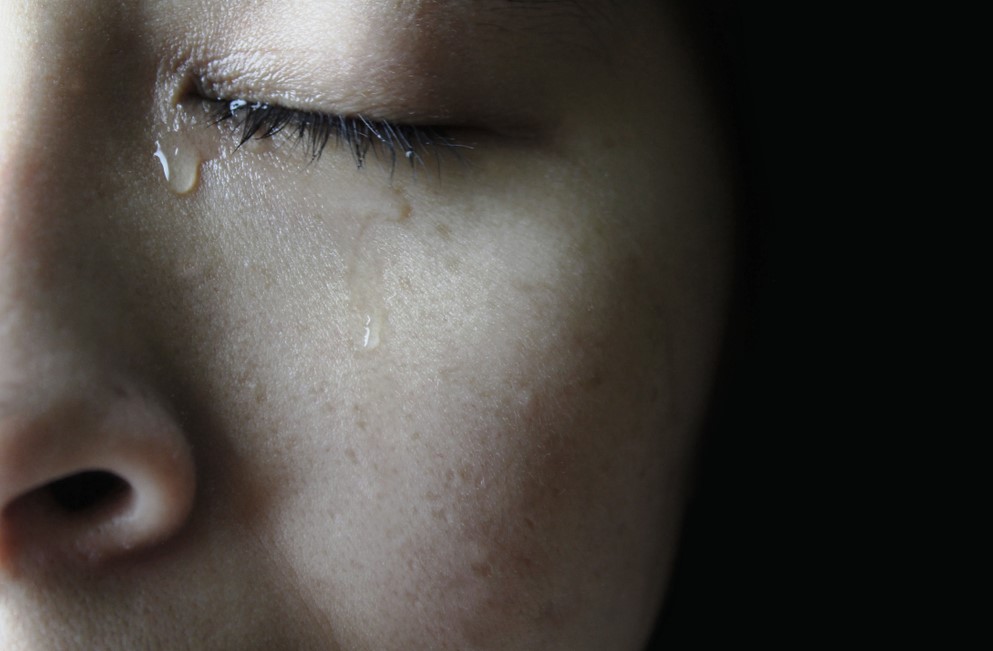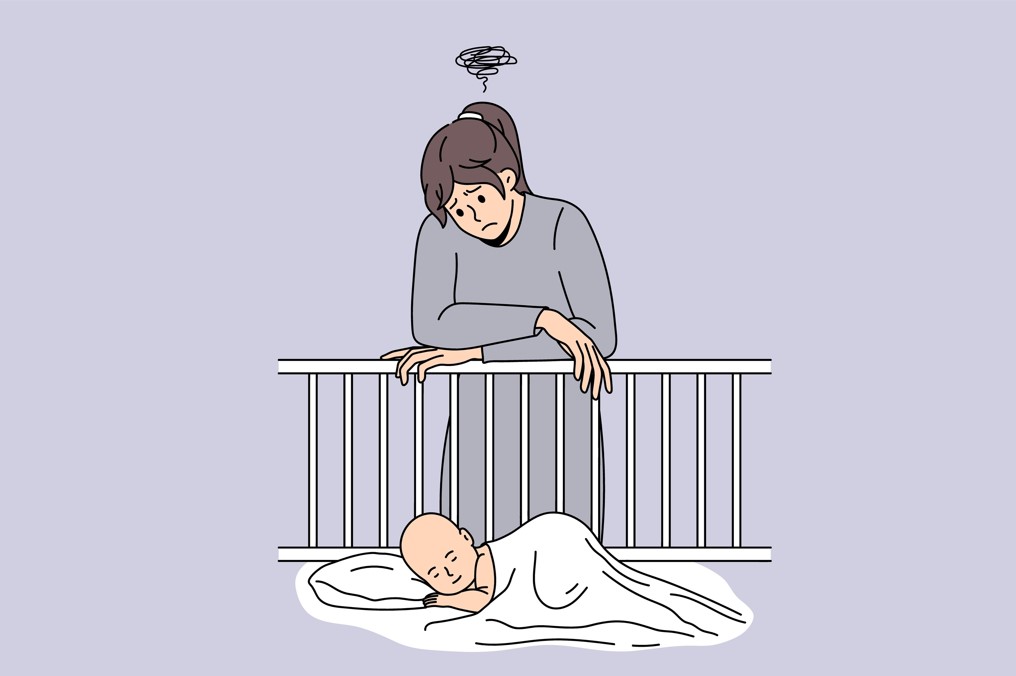"Women Come to Us in Difficult Situations, Begging for Help to Return to Life"
What happens to a woman who falls into postpartum depression, what makes her realize she needs professional help, and is there really a chance to get out of such a difficult situation? Dr. Vered Bar, director of 'Chava Clinic' at Sheba Medical Center, shares particularly moving stories.
 (Background: shutterstock)
(Background: shutterstock)When Talia (26) gave birth to her first daughter, she was the happiest person on earth. "The birth was a dream come true, and it went smoothly without any problems," she says. "We had an amazing baby girl, with normal weight and the highest Apgar score. We were discharged home after two days, and I was glad that everything went well and that I could start my maternity leave. But for some reason, the great happiness I was expecting didn't come."
Talia finds it difficult to pinpoint the moment when everything went wrong. "But it happened very quickly," she says. "I started to feel sad, just a big sadness sitting on me. Everything seemed wrong and caused me to have crying fits. I didn't want to leave the house, not to my mother's and not to friends who wanted to see the newborn. I preferred the dark room and would get out of bed only every few hours to feed the baby. If the baby cried more than usual or soiled her clothes, I cried along with her and blamed myself for being a bad mother. At some point, I began to struggle with breastfeeding, and then I completely broke down, feeling that I was unsuccessful, worthless, and unable to function."
 Photo: shutterstock
Photo: shutterstock
Returning to Normal Life
It took time before Talia began to understand that she was suffering from postpartum depression, and even more time before she realized she needed to address it, that it wouldn't go away on its own. "On one of the days, I felt I couldn't take it anymore," she says. "Although at first, I asked my husband not to share with anyone what I was going through, I informed him that I needed help. I turned to the nurses at the Well-Baby Clinic, and they immediately understood what was going on and connected me with the 'Chava Clinic' at Sheba Hospital. On the same day, I went to them and begged for treatment."
Talia recently completed her series of treatments at Chava Clinic after being there for almost ten months. Her daughter is already one year old, and according to her, "Our lives look different now. They saved my life, helped me be a mom, return to myself, and function like a regular woman."
But as it turns out, Talia is not the only one coming to the clinic, as in recent years, awareness of the great need for treatment in cases of postpartum depression and the possibility of receiving it has increased.
"Our clinic is very unique," notes Dr. Vered Bar, who has been managing Chava Clinic for the past decade. "The prevalence of postpartum depression is rising with the years, and today it is commonly argued that one in five or six women will be in postpartum depression. We also see a very high increase in approaches and much more awareness of the subject, and yet I think that women sometimes remember to contact us too late."
What do you mean?
"My dream is for every woman to come and consult with me or another professional even before she gets pregnant, regarding her risk factors for depression before or after childbirth. I think that just as it is common today to consult about genetic issues or various illnesses, it is also important to check the emotional aspect."
And at what stage do most of the women come to the clinic?
"Most women contact us in the months following the birth—from a week after delivery to half a year later, usually as a result of depression outbreaks or symptoms that seem like depression to them. About 20% of the women contact us during pregnancy because they start feeling depression symptoms or fear that it will develop in them because they suffered from it after previous births, or their mother tells them she had postpartum depression, or for any other reason. Additionally, about a quarter of the consultations come from women who experienced a stillbirth and want support groups and treatment to help them return to life after the hard loss, as well as prepare themselves for a new and healthy pregnancy and go through it without traumas.
"We receive hundreds of inquiries every month, and it pains us that we cannot accommodate all the women," notes Dr. Bar. "I wish we could give answers to everyone, and the thought occupies us constantly as a team. Meanwhile, we are doing our utmost to expand the departments, and along with that, we also make sure to train as many therapy teams as possible outside of Sheba, in various places across the country, including in the Haredi sector, with the belief that the more comprehensive the response is, the more we can help more women."
 Photo: shutterstock
Photo: shutterstock
Professionally and Sensitively
And what exactly is offered at the clinic?
"Our clinic offers several therapeutic programs, primarily a program that provides support for women with depression before or after childbirth, offering conversational therapy, group, psychiatric, and more. Additionally, we have a 'mother-infant therapy day unit' that provides three treatment days a week, where the woman receives everything that can help her in her situation—meetings with a psychiatric doctor who prescribes medication if needed, a social worker who advises, a psychologist, a mother-infant relationship therapist, and many other professionals. We also hold therapeutic groups with other women in similar situations, which really helps them when they share and feel they are not alone."
"We also offer a very special 'online home hospitalization' service that allows women who need hospitalization but are not dangerous to themselves or the baby, and have someone at home who can be a central support, to be discharged with a tablet accessible only to therapists at the hospital. The idea is to provide them with 24-hour accompaniment from our staff, who see them and are also available for talks when needed. The availability is full, just like in the department."
Dr. Bar emphasizes that as part of the service, Chava Clinic makes sure to provide support to the patient's family members, who sometimes feel helpless when they see her in such a state and want to know how they can help her and also how to deal with the phenomenon that has befallen them. "We have special professionals who care and advise them too," she explains.
"There is Always a Chance"
The woman who came to Sheba's Chava Clinic shortly after birth was in a very severe condition. Her family believed she was suffering from postpartum depression, but the clinic diagnosed it as not a regular depression, but a severe and very rare psychotic condition, occurring at a frequency of one or two per thousand births.
Dr. Bar mentions that this woman was hospitalized in a unique framework different from the other departments previously mentioned. "This is a hospitalization framework intended solely for women who need full hospitalization and cannot stay at home because they are dangerous to themselves, or their family members struggle or fear dealing with them. They are hospitalized in our department, designated for women only, and receive treatment like in any psychiatric department. We insist that the family visit them daily and bring the baby for several hours, because even a woman in a very severe state still wants to see her baby, meet him, and care for him."
In the case of this woman, Dr. Bar notes that she was hospitalized in the department, with the baby brought to her daily. "Over time, her condition began to improve," she describes. "From a state where she was withdrawn and almost didn't speak, we noticed she started to open up a bit. The improvement continued, and over time we transferred her to a day treatment framework, which allowed her to return home, be with the baby at home, and lead a normal life. The medications were gradually reduced, and she felt much better."
"Then, one day, she shared with us that a new pregnancy was discovered. We accompanied her throughout this pregnancy, with much worry, thought, and preparation for the continuation. We involved the women's medicine department here at Sheba, and we were all moved when a healthy, whole baby girl was born. To our great joy, following the birth, she did not experience the same outbreaks as the previous time, but even so, we continued to accompany her throughout the year after the birth, and there was no limit to our joy when we saw that she was doing well and was a great and devoted mother to her children."
Dr. Bar stresses that the stories mentioned in the article are just tiny examples of extremely moving stories that pass through them, with women experiencing processes of breaking through the depression and returning to normal life. "Because there is always hope," she emphasizes, "and even one can escape from very difficult situations."
And there is also a phenomenon that particularly moves her: "I have noticed that there are women who were hospitalized with us and later went out of their way to post about their experiences, and even gave lectures to encourage other women. It's something I know is not easy, but the women who reveal themselves do so truly out of the belief that this way, they can also help and assist other women and raise awareness.
"We also had women who, after being discharged, decided to engage in a therapeutic profession, and themselves learned to address such situations and be of help. No doubt awareness of the subject is increasing partly thanks to them, and it is so important. Because women after childbirth generally expect to feel good and be happy and fulfilled. The black abyss they fall into often meets them when they are not prepared and unable to admit that this is what happened to them. Clearly, the more we talk about it, the more they understand they are definitely not the only ones in the world suffering from it, and most importantly—that there is no need to suffer, because there is a way to treat it."

